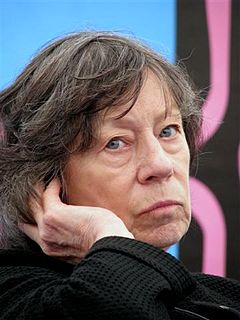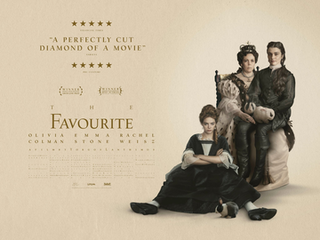Feminist film theory is a theoretical film criticism derived from feminist politics and feminist theory influenced by Second Wave Feminism and brought about around the 1970s in the United States. With the advancements in film throughout the years feminist film theory has developed and changed to analyse the current ways of film and also go back to analyse films past. Feminists have many approaches to cinema analysis, regarding the film elements analyzed and their theoretical underpinnings.
The Academy Award for Best Cinematography is an Academy Award awarded each year to a cinematographer for work on one particular motion picture.

Agnès Varda was a Belgian-born French film director, screenwriter, photographer, and artist. Her pioneering work was central to the development of the widely influential French New Wave film movement of the 1950s and 1960s. Her films focused on achieving documentary realism, addressing women's issues, and other social commentary, with a distinctive experimental style.

Laura Mulvey is a British feminist film theorist. She was educated at St Hilda's College, Oxford. She is currently professor of film and media studies at Birkbeck, University of London. She previously taught at Bulmershe College, the London College of Printing, the University of East Anglia, and the British Film Institute.

Rebecca Augusta Miller, Lady Day-Lewis is an American filmmaker and novelist, known for her films Angela, Personal Velocity: Three Portraits, The Ballad of Jack and Rose, The Private Lives of Pippa Lee, and Maggie's Plan, all of which she wrote and directed. Miller is the daughter of Arthur Miller, a Pulitzer Prize-winning playwright, and his third wife Inge Morath, a Magnum photographer. She was honored with the Maureen O'Hara Award at the Kerry Film Festival in 2009, the award is offered to women who have excelled in their chosen field in film.

Dorothy Emma Arzner[1] was an American film director whose career in Hollywood spanned from the silent era of the 1920s into the early 1940s. From 1927 until her retirement from feature directing in 1943, Arzner was the only female director working in Hollywood. Additionally, she was one of a very few women able to establish a successful and long career in Hollywood as a film director until the 1970s. Arzner made a total of twenty films between 1927 and 1943 and launched the careers of a number of Hollywood actresses, including Katharine Hepburn, Rosalind Russell, and Lucille Ball. Additionally, Arzner was the first woman to join the Directors Guild of America and the first woman to direct a sound film.
The celluloid ceiling is a metaphor for the underrepresentation of women in hiring and employment in Hollywood. The term is a play on the metaphor of the "glass ceiling," which describes an invisible barrier that keeps a given demographic from rising beyond a certain level in a hierarchy. Celluloid refers to the material used to make the film stock that was once used to make motion pictures. The term is usually applied to behind the screen workers only.

Tallinn Black Nights Film Festival, or PÖFF, is an annual film festival held since 1997 in Tallinn, the capital city of Estonia. PÖFF is the only festival in Northern Europe or the Baltic region with a FIAPF accreditation for holding an International Competitive Feature Film Program, which places it alongside 14 other non-specialised competitive world festivals including Berlin, Cannes, Venice, Karlovy Vary, Warsaw, and San Sebastian. With over 250 feature-length and over 250 short films and animations from 80 different countries (2018) screened, and an attendance of over 80,000 (2018), PÖFF is the one of the largest film festivals in Northern Europe. The festival, its sub-festivals and the audiovisual industry platform Industry@Tallinn hosted around 1200 film professionals and journalists in 2018.

Céline Sciamma is a French screenwriter and film director. A common theme in Sciamma's films is the fluidity of gender and sexual identity among girls and women.
Feminist pornography is a genre of film developed by or for those dedicated to gender equality. It was created for the purposes of encouraging women in their pursuit of freedom through sexuality, equality, and pleasure.
The Aesthetica Short Film Festival (ASFF) is an international film festival which takes place annually in York, England, at the beginning of November. Founded in 2011, it is a celebration of independent film from around the world, and an outlet for supporting and championing filmmaking. With over 400 films screenings and 100 industry events, ASFF is one of the UK's key film festivals.
Rachel Morrison is an American cinematographer and director. For her work on Mudbound (2017), Morrison earned a nomination for an Academy Award for Best Cinematography, making her the first woman ever nominated in that category. She has twice worked with director Ryan Coogler, first on Fruitvale Station (2013) then on Black Panther (2018).
In feminist theory, the male gaze is the act of depicting women and the world, in the visual arts and in literature, from a masculine, heterosexual perspective that presents and represents women as sexual objects for the pleasure of the heterosexual male viewer. In the visual and aesthetic presentations of narrative cinema, the male gaze has three perspectives: (i) that of the man behind the camera, (ii) that of the male characters within the film's cinematic representations; and (iii) that of the spectator gazing at the image.

The Favourite is a 2018 period black comedy film directed by Yorgos Lanthimos, and written by Deborah Davis and Tony McNamara. Set in early 18th century Great Britain, the film's plot examines the relationship between two cousins, Sarah, Duchess of Marlborough and Abigail Masham, who are vying to be Court favourite of Queen Anne. Co-produced by studios based in the United Kingdom, Ireland, and the United States, principal photography lasted from March to May 2017 and took place at Hatfield House in Hertfordshire and at Hampton Court Palace.

Women are involved in the film industry in all roles, including as film directors, actresses, cinematographers, film producers, film critics, and other film industry professions, though women have been underrepresented in creative positions.
The female gaze is a feminist film theoretical term representing the gaze of the female viewer. It is a response to feminist film theorist Laura Mulvey's term "the male gaze", which represents not only the gaze of a heterosexual male viewer but also the gaze of the male character and the male creator of the film. In contemporary usage, the female gaze has been used to refer to the perspective a female filmmaker (screenwriter/director/producer) brings to a film that would be different from a male view of the subject.
The International Collective of Female Cinematographers, is a collective of professional Cinematographers from around the world that recognizes and uplifts the outstanding careers of female cinematographers by connecting with filmmakers and production teams to find a qualified crew. In the top–grossing 100 films only 2% of them were shot by women cinematographers. The collective was founded in 2016 by a group of female cinematographers who wanted to act as allies within the film industry and provide each other with community support and advocacy. Notable members include Nancy Schreiber, ASC, Rachel Morrison, ASC, Amy Vincent, ASC, and Ellen Kuras, ASC.
Zoe Dirse is a Canadian cinematographer, film director, writer and professor. She is best known for her cinematography work for Studio D under the National Film Board of Canada, the first government-funded film studio in the world dedicated to women filmmakers.
The Paris Feminist and Lesbian Film Festival is a women-only film festival founded in Paris, France, in 1989. The festival is organized by Cineffable, an association dedicated to promoting lesbian cinema, and encouraging lesbian creativity.
Johanson analysis, developed by film critic MaryAnn Johanson, provides a method to evaluate the representation of women and girls in fiction. The analysis evaluates media on criteria that include the basic representation of women, female agency, power and authority, the male gaze, and issues of gender and sexuality. Johanson's 2015 study, funded by a Kickstarter campaign, compiled statistics for every film released in 2015, and all those nominated for Oscars in 2014 or 2015. She also drew conclusions about movie profitability when women are represented well.








